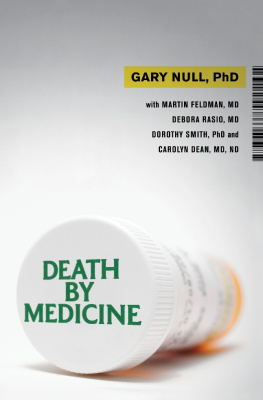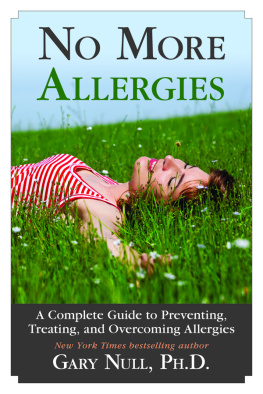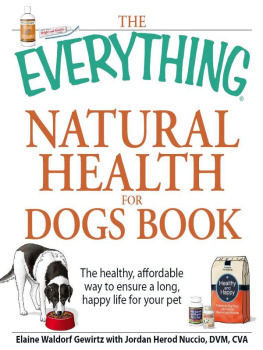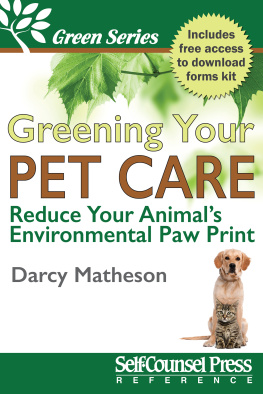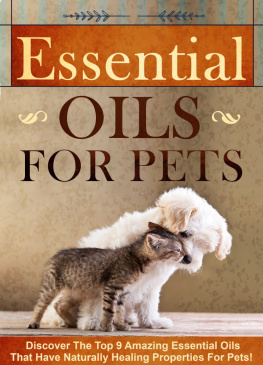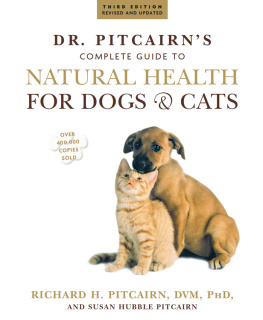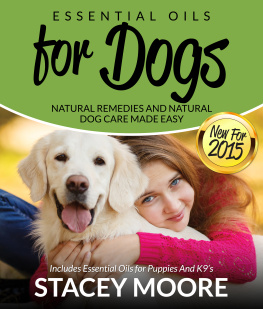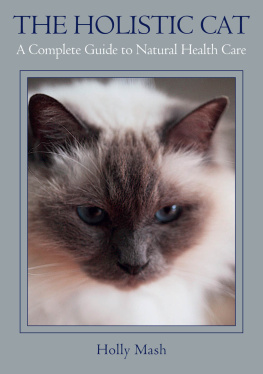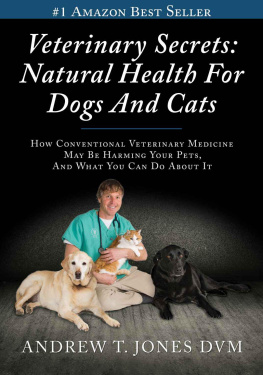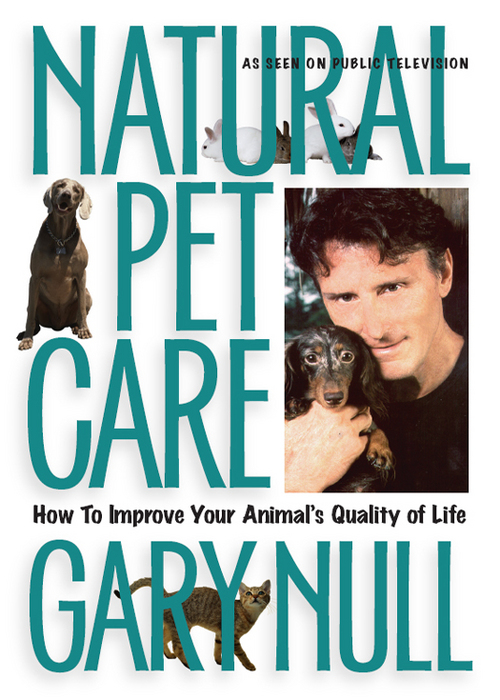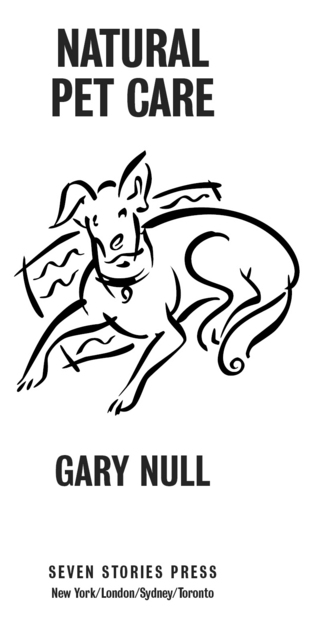Copyright 2000 by Gary Null
A Seven Stories Press First Edition
All rights reserved. No part of this book may be reproduced, stored in a retrieval system, or transmitted in any form, by any means, including mechanical, electric, photocopying, recording or otherwise, without the prior written permission of the publisher.
Seven Stories Press
140 Watts Street
New York, NY 10013
www.sevenstories.com
Library of Congress Cataloging-in-Publication Data
Null, Gary.
Natural pet care / Gary Null.1st ed.
p. cm.
eISBN: 978-1-60980-267-7
1. PetsHealth. 2. PetsNutrition. 3. PetsDiseases
Alternative treatment. I. Title.
SF413.N86 2001
636.0887dc21 00-050951
College professors may order examination copies of Seven Stories Press titles for a free six-month trial period. To order, visit www.sevenstories.com/textbook, or fax on school letterhead to (212) 226-1411.
v3.1
ACKNOWLEDGMENT
The author wishes to thank the following people for their help in producing this book:
Editing: Vicki Riba Koestler, Lois Zinn, Sloane Seale, Dominga Rosalita Wilson, Kim Coombs
Research: Jenny Barbosa, Matt Brown
Expert review: Dr. Robert S. Goldstein, Dr. Nancy Scanlan, Alicia McWatters
TABLE OF CONTENTS
INTRODUCTION
I f youre like me, you cant imagine living without pets. I have always had them. Over the course of my life, from early childhood on, Ive had every kind of pet you can think of. As an adult, owning a farm in upstate New York, a ranch in Texas, and then a ranch in Florida, Ive had pets ranging from buffalo to Scottish long-haired cattle, to elk, foxes, coatimundi, anteaters, ring-tailed lemurs, horses, goats, chickens, peacocks, cows, cats, dogs, and exotic fish. Ive learned a great deal in these many years about how to help these animals live long and healthy lives. That knowledge is what I now want to share with you.
And I know that there are many people who are eager to put such knowledge to use. Right now, there are more pets in America than people, which means that many people have more than one pet. And many count their pets among the most beloved members of their family. These people are willing to go the extra mile for their cherished animal companions. In fact, people will frequently do things for their pets that they would not do for themselves, as Ive discovered after a long career of trying to educate the public about how to prevent or reverse sickness using natural means, and discovering that despite a vast supply of resources, many folks will frequently not take beneficial measures for themselves, either because they think its too much trouble, or even, deep down, because they think they dont deserve it. But for their pets, these same people will do the right thing. While it doesnt make any sense, on the pet side of the equation its no mystery why people are wildly devoted to their animals.
Pets are the ones, after all, that provide us with unconditional love, joy, comfort, and an emotional vulnerability and warmth that are not easily obtained from other humans, at least not adult humans. Indeed, pets are like children in these respects, but theyre like children who never grow up and go out into the world, so that they always need us to feed them, give them shelter, and give them warmth. And unlike humans, who are not always grateful for the energy that we put out, pets are filled with unlimited amounts of love for us. If youre having a rough day, if youve been around someone who may have been insensitive, unkind, or thoughtless, you can always bet that when you open the door, your pet will be glad to see you. There will be a wagging tail, the chatter of little bird voices, the rapid movement in the water of fish, a purring sound, a brush against your leg to make a connection. Suddenly youre needed, appreciated, loved for who you are, not for what youve achieved or for your income level.
Theres a bond thats created with pets that is deep, meaningful, even spiritual. One of the first things that pet owners ask others with dogs or cats is, Where do your animals sleep? And with a lot of people its in bed, of course. There has to be a real feeling of closeness when we allow something or someone to be with us during our most vulnerable time, our sleep. To me this illustrates the trust and love that we share with these creatures.
Most pets, with the exception of some birds and horses, have a short lifespan. The irony is that the one we care so much about we know, in all probability, will die before we do. So theres a great sense of the preciousness of the moments we spend with our animals. Staying bonded with them and having them at your side becomes doubly important. Those people who work from home know that animals are generally going to be right there with you during the day. Indeed, that friendly shadowing by an animal is one of the plusses of working at home.
A group that particularly benefits from the presence of pets is home-centered senior citizens. When you put a pet around a senior citizen you frequently see a joy and a vitality re-emerge in that persons life. Pets have unique personalities, but they all seem to say, Pay attention to me, and they respond to your attention. Whats nice about most senior citizens is that they have a great deal of patience, and they have the time to really pay attention. They can take their time to do things with a sense of quality and care, which makes them a perfect match for pets. Evenand especiallyelderly people in nursing homes can have mutually beneficial relationships with pets.
Actually, human beings have always had a symbiotic relationship with animals, even as our perceptions of them have changed over the ages. Animals were once treated as gods. The ancient Egyptians reverence for cats is the best-known example of this; in that society, killing a cat was punishable by death. Cats certainly lost their privileged status in medieval Europe, when they became associated with witchcraft and were often killed. Not only was this a cruel practice, it harmed European civilization, which could have used cats to get rid of plague-carrying rats.
For much of history, working animals, such as horses, were essential to human survival. People didnt have horses for the joy of riding. They had horses because they needed them to take them from one place to another. Whats more, a horse would plow your field. You couldnt do that job by yourself, and thus, you respected your horse. You understood that if you didnt take care of him, that horse was going to die, and so would your farm, and maybe your family. Likewise, sheep and goats performed essential services, providing wool for warmth and milk for nourishment. Dogs were workers too: Some were bred for hunting; the smaller ones were bred for going into holes after rabbits and foxes, the larger ones for hunting larger animalsbears or boarsor for protection. If you look at ancient paintings and drawings and read the literature of antiquity, youll see that peoples animals were a very important part of what they considered their possessions to be. And people knew that if they abused their animals, or were indifferent to them and they died, that could directly affect their own welfare.
Its amazing to realize that its only in the past hundred years that weve come to look at animals less as beasts of burden or work-mates and more as pets. Except for those farmers who happen to have livestock for slaughter, almost everyone else who has animals has them for the joy of their company.


